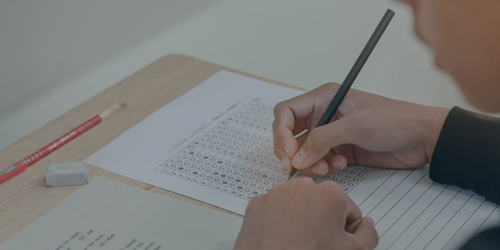KMAT Kerala is an integrated entrance examination through which students can get admission in a number of government and private MBA and PGDM institutes situated in Kerala state. KMAT Exam is conducted once a year in offline mode.
Highlights
1: Total Questions: 180
2: Total Marks: 720
3: Duration: 2 hours 30 minutes
4: Type of Question: Multiple Choice Questions (MCQs)
5: Exam Mode: offline (pen and paper-based)
KMAT 2021 Exam pattern
| Sections | No. of Questions | Maximum Marks |
| Quantitative Aptitude | 50 | 200 |
| Verbal Ability and Reading Comprehension | 50 | 200 |
| Logical Reasoning and Data Sufficiency | 40 | 160 |
| General knowledge and Current Affairs | 40 | 160 |
| Total | 180 | 720 |
NOTE: For every correct answer, the candidate is awarded 4 marks and for every wrong answer, 1 mark will be deducted.
Planning for Each Section
1. Quantitative Aptitude
The syllabus for this section consists of Percentage, Time and Work, Pie Chart, Profit and Loss, Number System, Bar Graph, Time-Speed-Distance, Data Interpretation, Basic Arithmetic, Simple Interest, Compound Interest, Algebra, Series, etc.
Go back to the basics and fundamentals of Mathematics, however easy you may think it to be. Follow your academic syllabus so that you can cover all the major topics. Give mock tests and Practice previous years parers as it will make you fast and accurate while solving the arithmetic questions. Memorize all the basic formulas and theorems present in the syllabus. Know your strong and weak sections and attempt accordingly. First attempt your stronger areas as you will have few guaranteed marks beforehand, then attempt the weaker section, but keep in mind the negative marking. Do not give several minutes to a single question that is taking too long to answer.
2. Verbal Ability and Reading Comprehension
The syllabus for this section is Grammar, Vocabulary, Critical Reasoning, Para Jumbles, Word Meaning, Fill in the Blanks, Antonym, and Synonym, Tense, Reading Comprehension.
To do well in this section, one must be work on 3 particular areas, which are:
- Vocabulary
- Basic Grammar
- General Reading
The third area is the most important one. Reading newspapers, books, novels, blogs, etc. will improve your understanding skill, grammar, and also vocabulary. The more you will read, the more the chance to finish the passage section in reading comprehension. There are no formula and theorems required in this section, so all you need is to read and practice.
3. Logical Reasoning and Data Sufficiency
The syllabus for this section is Table, Bar, Pie, Line graphs etc, Blood Relations, Direction Sense, Puzzles, Arrangements, Data Structures, Series, Coding-Decoding, Clocks, and Calendars.
Unlike the other two sections, this section does not require remembering or reading, but a fully functional working brain. You need to analyze and understand the question first. use the science of deduction to find the correct answer. This section is usually confusing with puzzles and relation-based questions which may have two similar types of answer that seem correct. in those cases, you must use that art of elimination to find out the real answer.
Time management is the key here. Do not let yourself get stuck on one question. If you are not able to answer it quickly, leave it and move on to the next. As KMAT Kerala exam contains negative marking, it doesn't matter whether you answer more questions, it matters how many questions you answered correctly.
4. General knowledge and Current Affairs
To be a Master in General Knowledge takes time and requires Patience. There is no book that can make you an expert in General Knowledge. make it a habit to read quality newspapers, not only pictures but content too. Gain a basic knowledge of History/ Science/ Geography/ politics at the school level. Watch news channels, educational channels, sports channels, and fewer reality shows. Follow the great personalities of the world and read about them. Dedicate not much but a subsequent amount of time to be knowledgeable enough to attempt 80% of the question.
KMAT Study Materials
- One of the best ways to prepare for KMAT Kerala is to read related books and give mock tests and previous year question papers.
- Few of the books to prepare for KMAT Kerala:
- KMAT – Karnataka Management Aptitude Test Paperback 2018 by Chandresh Agrawal
- Karnataka - KMAT Complete Reference Book Textbook binding - 2018 by Praxis Groups
- KMAT/KPGCET Karnataka Management Aptitude Test / Karnataka Post Graduate Common Entrance Test Success Master 2012 by Experts Compilation
- Quantitative Aptitude for Competitive Examination Tips, Techniques, and Short-cut Methods by Abhijit Guha
- Pearson Guide to Verbal Ability and Logical Reasoning by Nishit Sinha
- How to Prepare for Data Interpretation by Arun Sharma
- Class 8th, 9th, 10th, 11th and 12th Textbooks of NCERT/Kerala State Board
- Verbal Ability by Wren and Martin
So the students that are preparing this exam should briefly go through the ways to approach each section as mentioned above.
To know the FAQs about MBA and PGDM, click here
Read also, Entrance exam that is best for MBA/PGDM in India
To know the highest paying MBA careers, click here











